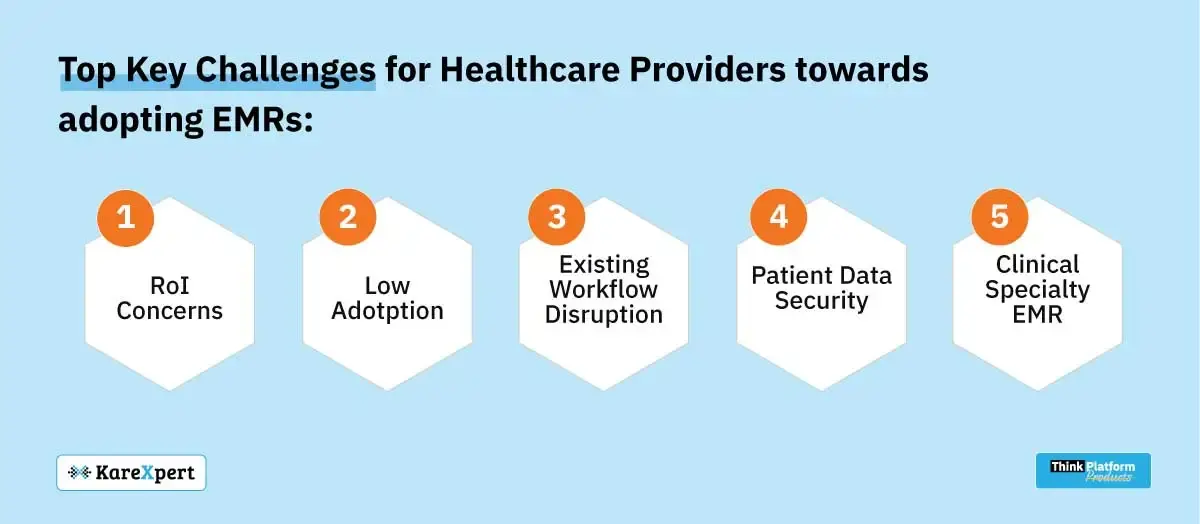Why Healthcare Providers Think Twice Before Implementing EMR – And Why We Should Reconsider

Why Hospitals Hesitate to Implement EMR – and Now It’s Time to Reevaluate
In the rapidly advancing world of healthcare, Electronic Medical Records (EMR) have become a cornerstone of modern medical practice. However, like any significant change, the adoption of EMR systems often brings a mix of apprehension and skepticism among healthcare providers. While there may be initial hesitations about integrating EMR systems, the multitude of benefits they bring often decidedly outweighs these concerns. Here, we delve into why some might hesitate to implement EMRs and offer compelling reasons to reconsider their transformative potential.
Factors Contributing to the Cautious Approach Towards Adopting EMRs
1. RoI Concerns
The initial setup and implementation of an Electronic Medical Record (EMR) system can be expensive. Healthcare facilities, especially administrative stakeholders, often worry about the extra financial burden. As there doesn’t seem to be direct benefits via implementing Electronic Health/Medical Record systems, new hardware may be required, which is an extra burden on the owners.
2. Low Adoption
As Electronic Medical Records (EMR) is used by doctors and nurses who are already burdened by the work, learning to navigate the EMR software can be daunting. The perception that EMR systems require extensive training can deter healthcare providers.
3. Existing Workflow Disruption
Integrating new systems may involve changes in established manual workflows. The possibility of disrupting current routine clinical practices can cause reluctance.

4. Patient Data Security
With rising cyber threats, some providers are cautious about storing sensitive patient information electronically, fearing breaches and data theft.
5. Clinical Specialty EMR
Many legacy EMR systems are not designed to adapt per specialty, which might hinder the data filled by doctors for patient quality care. They may have to maintain both paper as well as digital records, which is an extra step without much benefit.
Post-pandemic, digital healthcare importance has changed, requiring quality clinical data for better and continued patient care. Many advancements in new technologies, including cloud, AI/ML, mobile apps, and many government initiatives, have overcome many challenges faced by healthcare providers for EMR/EHR adoption. The advantages of EHR/EMRs are compelling and can significantly enhance the operational efficiency and quality of care in healthcare facilities.
Advantages of EMR Systems
1. Improved Continued Patient Care
Electronic Medical Records (EMR) provide healthcare professionals with immediate access to comprehensive patient data. This accessibility enables more accurate diagnoses, faster treatment decisions, and better overall patient care. Unlike paper records, which can be incomplete or inaccessible, EMRs ensure that detailed patient histories, including past diagnoses, treatments, and allergies, are just a click away.
2. Enhanced Coordination
Electronic Medical Records (EMR) systems excel in environments where multiple healthcare providers collaborate to care for patients. They allow different specialists to access the same updated patient records simultaneously, regardless of their location. This not only helps in ensuring consistency in patient care but also eliminates the redundancies and errors that often occur with manual record-keeping. Centralized system of records and data lake concepts make it easy for large storage of data across multiple healthcare providers.
3. Streamlined Operations
Electronic Medical Records (EMR) can greatly streamline administrative as well as clinical tasks like scheduling, billing, and compliance reporting. These systems often come with tools for analyzing practice patterns and optimizing operations, thereby increasing efficiency and reducing administrative burdens. The time saved on paperwork can be redirected towards more patient-focused activities. Now EMR interfaces are available on the devices mobile, web, tablet which make this easily accessible.
5. Increased Patient Participation
Modern Electronic Medical Records (EMR) systems often include patient portals, which provide patients with direct and real-time access to their health records, lab results, and prescription details. This transparency and accessibility can enhance patient engagement and satisfaction, as patients feel more involved in their healthcare processes. These patients health records are available on all the devices, web, mobile.
6. Better Compliance with Regulations
Electronic Medical Records (EMR) help healthcare providers comply with regulatory requirements more efficiently. Features like automated alerts for drug interactions, reminders for preventive screenings, and tools for clinical reporting help ensure that practices adhere to industry standards and legal requirements.
7. Long-term Cost Savings
Though the initial investment might be significant, the long-term savings associated with Electronic Medical Records (EMR) are undeniable. By reducing the need for physical storage, streamlining administrative tasks, and minimizing clinical errors, EMRs can dramatically decrease operational costs over time. Cloud storage availability at low cost is also making this data more accessible.
8. The Case for Reconsideration
Given the robust benefits highlighted, healthcare providers initially hesitant about Electronic Medical Records (EMR) implementation should reconsider their stance. The transition to digital records is not just an upgrade—it’s a vital step towards optimizing healthcare delivery in this Generative AI era.
Are you ready to transform your healthcare practice with the leading EMR technology? KareXpert provides a state-of-the-art EMR system designed to simplify workflows, boost efficiency, and enhance patient care across your practice. Discover the advantages of going digital with KareXpert’s EMR solutions. Contact us today to learn more and Schedule a Demo. Let KareXpert help you navigate the EMR landscape seamlessly.
By considering the broader perspective on EMRs, healthcare facilities can make informed decisions that align with their commitment to providing excellent patient care and maintaining operational efficiency. With the continuous evolution of EMR technology, the advantages are set to expand even further, making it an indispensable tool in modern medical practice.
Contact KareXpert today to know more!
Website: https://www.karexpert.com/
Email: info@karexpert.com
Phone: +91-9069113330
